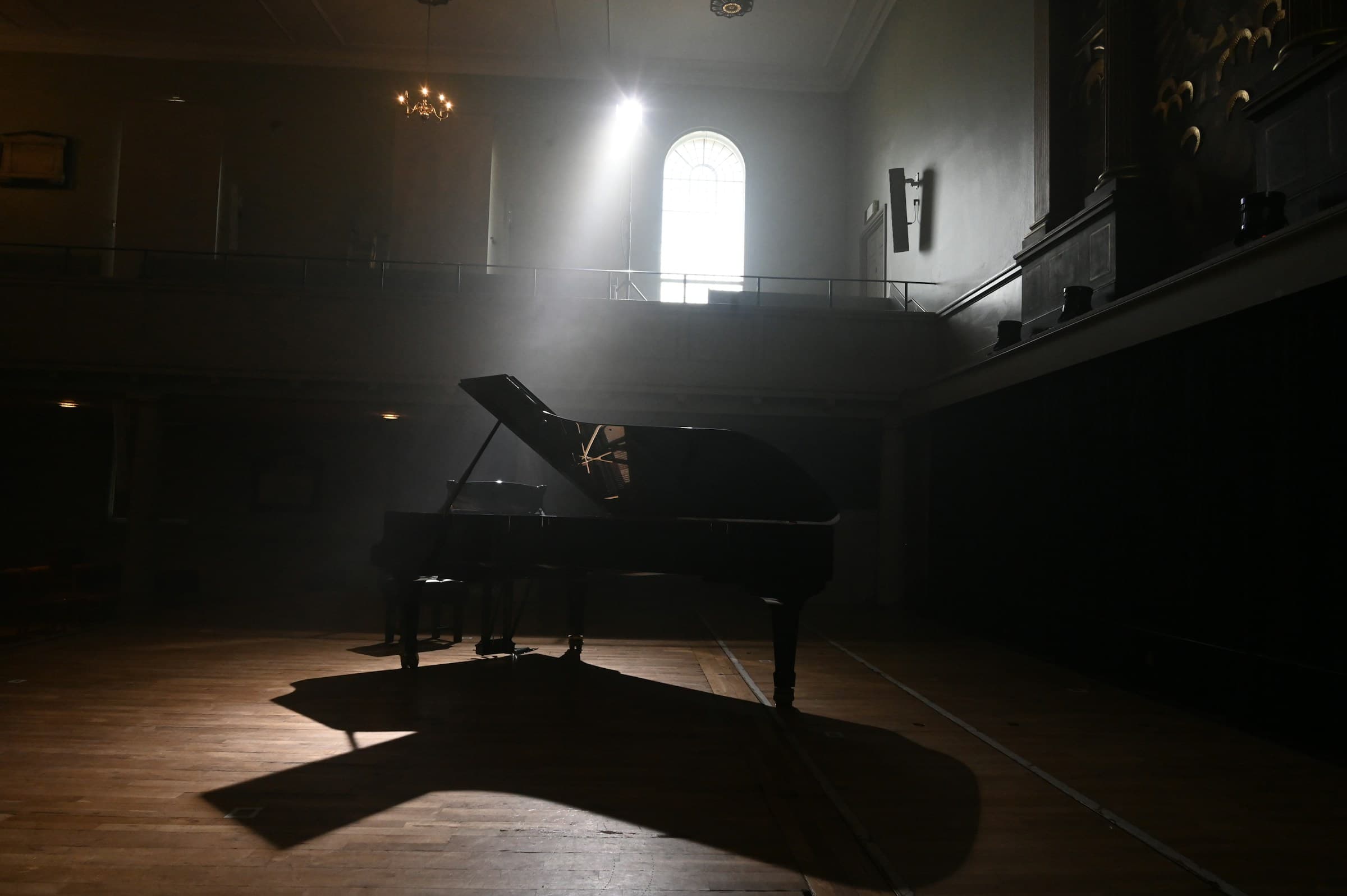
About Competition
Information
Established and inaugurated in 1927, the International Fryderyk Chopin Piano Competition is one of the oldest music events of its kind in the world. 2025 will see the beginning of a series of special celebrations for its centenary. In the course of the past century, the formal aspects of the competition have constantly evolved, resulting in changing the number of its stages, programme, judging criteria, prizes, and also the media through which audiences have experienced the competition recitals. There have only been two elements of the Competition that have remained unchanged since its inception: Chopin’s music and the fascination of pianists and audiences alike. Another chapter in the hundred-year-long tradition is opening before us. The competition is organised by the Fryderyk Chopin Institute.
Chopin Competition: 100 years of tradition
For the time of the Chopin Competitions, Warsaw becomes the most extraordinary city of the world, enchanted and intoxicated with music. A sight to behold!
Jerzy Waldorff “Eight times Chopin”, Nasza Ojczyzna 1970, No. 10.
The competition was established late in the 1920s as a response to the flagging interest in classical music and – hardly imaginable today – the scant recognition of Fryderyk Chopin’s works. The main purpose for Professor Jerzy Żurawlew, the man behind the concept of the Chopin Competition, was to initiate a discussion about performing Chopin’s music and promote the composer’s oeuvre. To achieve that, he incorporated, in an exceedingly innovative way, the element of sporting competition into high culture. Many years later, when the competition had already become a recognised prestigious event in the world of classical music, Professor Żurawlew reflected: “I came up with the idea to introduce a touch of sporting rivalry into Chopin’s music, precisely to popularise it among the young people. (…) Even back at that time, I realised that to fulfil its purpose, such an event has to be organised on a grand scale. This simply has to be an international event.”
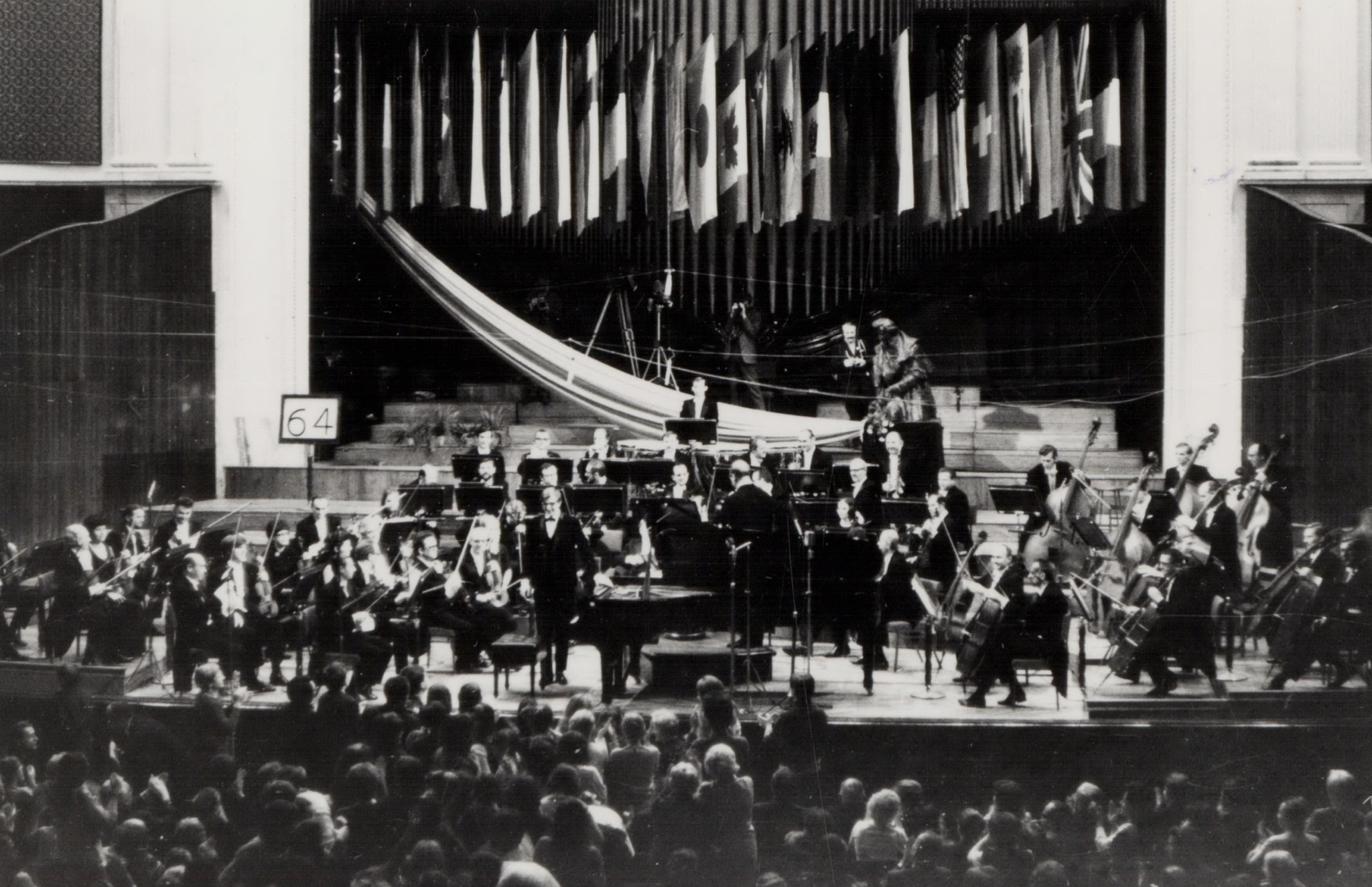
The Chopin competition exceeded all the hopes invested in it: its second edition held in 1932 attracted over 200 pianists from all the world over. Organisation of the event became impossible over several years because of the Second World War, nevertheless the tradition was revived in 1949. It was then that the competition began to be held in the regular five-year cycle. In the 1950s, it attained a truly international stature: serving in the broad jury were the most illustrious celebrities of the time, notably the winners of the previous competitions – Lev Oborin, Yakov Zak, and Imre Ungár – and one of the most eminent composers of the twentieth century, Witold Lutosławski.
The Chopin Competition fully flourished in the 1960s and 1970s, as confirmed by the names of its great winners, to mention Maurizio Pollini, Martha Argerich, and Arturo Moreira Lima. The 1970 edition owed its particular significance for both American and Japanese pianism thanks to Garrick Ohlsson claiming First Prize and Mitsuko Uchida becoming the runner up. The hosts triumphed five years later, when Krystian Zimerman became the first Polish winner in twenty years. With time, the prestige and popularity of the Competition began to outshine all other artistic events related to Chopin. Each subsequent edition attracted more young pianists, travelling to Warsaw from all corners of the globe. The winner of the 10th Competition in 1980 was Đặng Thái Sơn from Vietnam, while the most passionate reactions were provoked by the performances of Ivo Pogorelić from Yugoslavia.
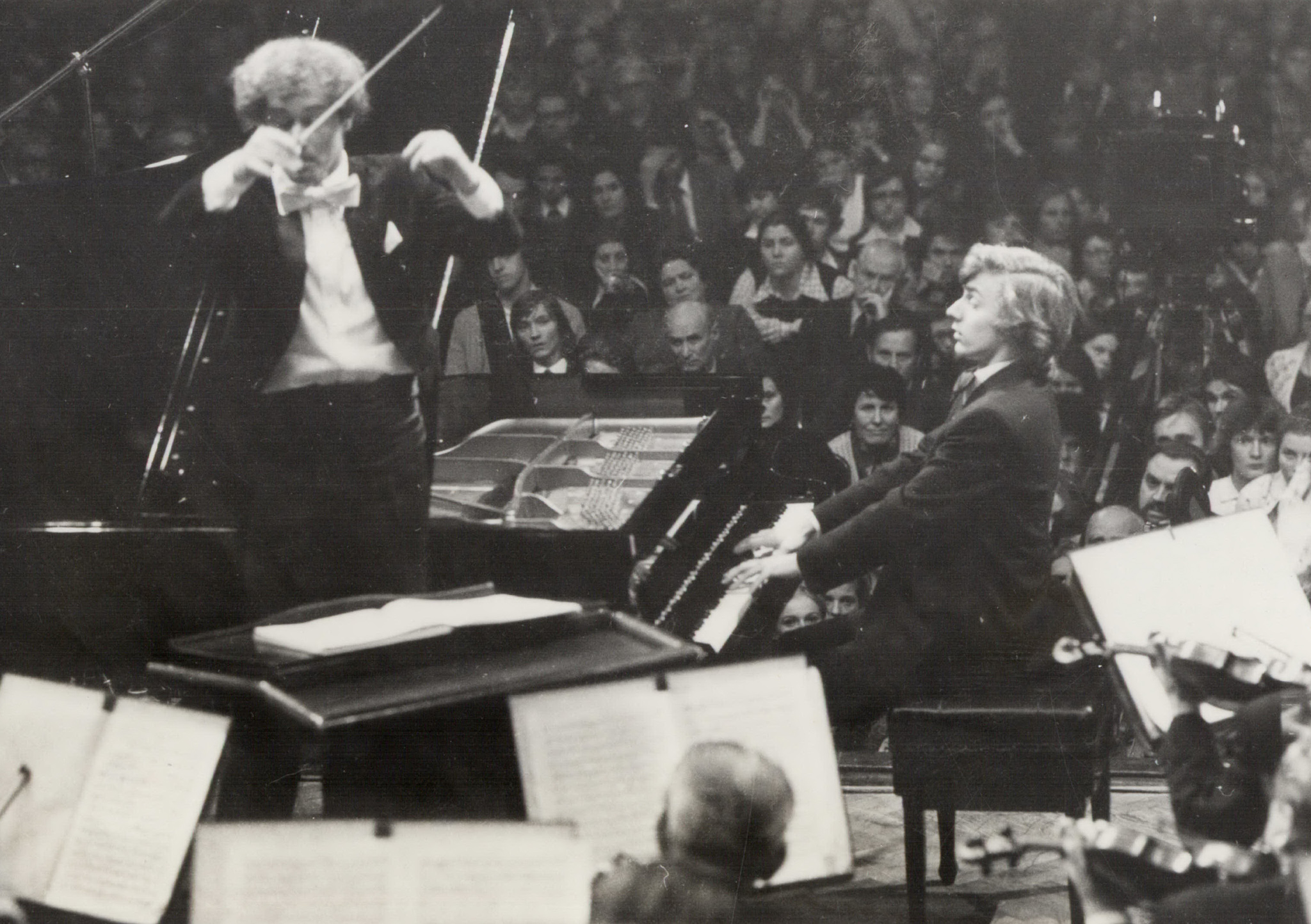
With the new media transforming the cultural and social paradigm, the twenty-first century set new challenges for both the organisers and winners of the Competition. Both these groups have been adapting to this situation very well. In 2000, Yundi Li, the winner of the competition became a global superstar. The triumphant winners of the two most recent editions Seong-Jin Cho (2015) and Bruce Liu (2021) are eagerly sought after on stages across the world. Performances of all these pianists shared via social media reach global audiences counted in hundreds of millions.
Chopin Competition: the World’s Most Widely Covered Competition
The atmosphere reached the peak of tension. (…) Finally, following a storm of thunderous applause, Imre Ungár, the blind Hungarian pianist, was ushered onto the stage. The audience was visibly moved as Ungár played. One lady even fainted after the first movement of the Concerto in E minor, performed with an extraordinary depth. “The heat and emotion overwhelmed her nerves”, Mr Wieniawski, president of the jury, announced on the microphone. Ungár’s performance was followed by a never-ending storm of applause. Captivated by that, the jury agreed to make an extraordinary concession and allow the artist to perform solo. However, being tired, the artist requested not to be asked to perform any encores.
[author unknown] “The Russian Uninsky and Blind Hungarian Ungár Triumph at the International Chopin Competition” Express Poranny,
24 March 1932, No. 84, p. 1
Research conducted by independent media organisations (Institute of Media Monitoring, Press Service) demonstrates that the recent editions of the Chopin Competition generated unprecedented global interest. The greatest reach during the 2021 Chopin Competition was achieved by content published on the Chopin Institute’s YouTube channel. In October 2021 alone, the videos published there were viewed an astounding 37.5 million times, with the total watch time close to 8 million hours, more than quadrupling the result achieved by the previous edition.
Even though the audiences were many thousands of kilometres apart – with over 50% of the viewers being Japanese, and broadcasts also enjoying great popularity in Poland, South Korea, the United States, and Taiwan – they developed an engaged community. Proof to this can be found in the number of comments posted during broadcasts, published at a rate exceeding 20 per second at peak moments, and also in the numbers of live viewers: at one point, close to 62,000 people followed the transmission simultaneously.
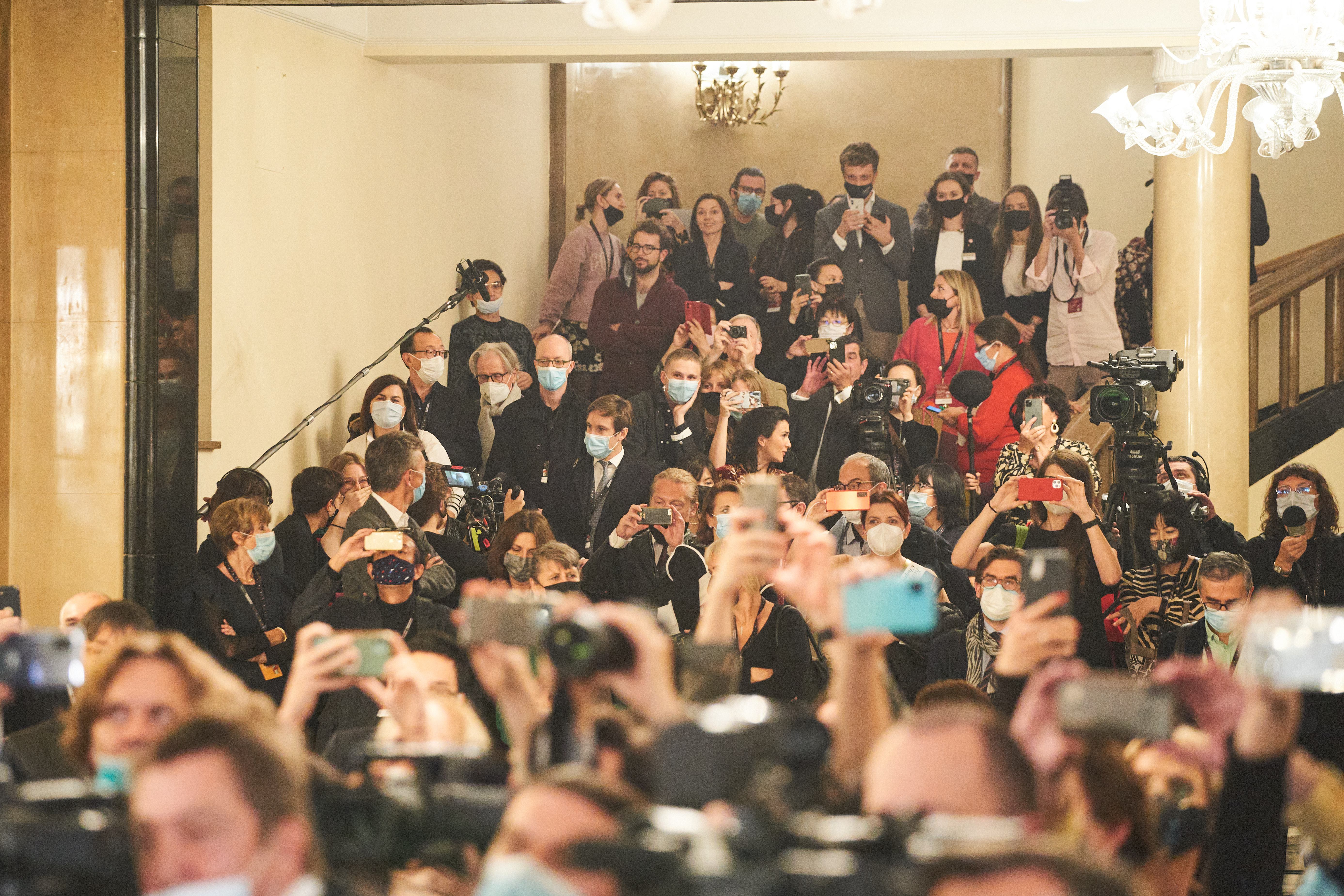
According to the Press Service report prepared for the Fryderyk Chopin Institute in October 2015, media coverage of the 17th Chopin Competition (covering online platforms, the press, radio, and television) achieved a record global reach of nearly 5 billion. In 2021, the number of publications about the 18th Chopin Competition published in Poland and around the world was estimated at 65,000, reaching the advertising value equivalent (AVE) of approximately USD 39,315,664. Remarkably, according to the study, none of the over 65,000 pieces of content was negative.
19th Chopin Competition. When the Whole World Lives and Breathes Chopin
Once the last finalist completed his programme, the audience packed densely in the hall kept waiting for the jury’s verdict until 2:30 in the morning, in the meantime, watching The Unfinished Symphony, a film about Schubert, starring Martha Eggerth. However, when the results were announced, and it became evident that the prize list did not include the audience’s favourite, the beautiful Chieko Hara from Japan, performing in a kimono (…) the crowd in the hall erupted in such a dreadful protest that the jury and the hall were only saved from the direst of consequences by a wealthy industrialist, Stanisław Meyer. Present among the audience, he there and then founded the “Audience Award” for the aggrieved pianist from Tokyo, and thus calmed the storm down.
Jerzy Waldorff “Wielka gra”, [in:] Ibidem, Selected Works, vol. 4, Warszawa 1993, p. 78.
The 19th Chopin Competition will officially commence on 2 October 2025 with the opening concert by the winners of previous editions. Following an initial selection of applications, the jury has chosen 161 pianists and invited them to Warsaw for the Competition’s Preliminary Round in April and May 2025. Of their number, only around 80 will advance to the main Competition held in October. Even qualifying for the Competition is a remarkable achievement in itself. Following the customary routine, the October auditions will last for three weeks. On 20 October, we will learn the name of the new winner of the Chopin Competition, an artist certain to make their mark on the history of piano performance. The Awards Gala and the first of three concerts by the winners will be held on the following day.
Following the tradition, the scores awarded to each participant will be published after the conclusion of the Competition, ensuring transparency in the awarding process. The first prize winner will receive €60,000 and a gold medal, while the total prize pool exceeds €240,000.
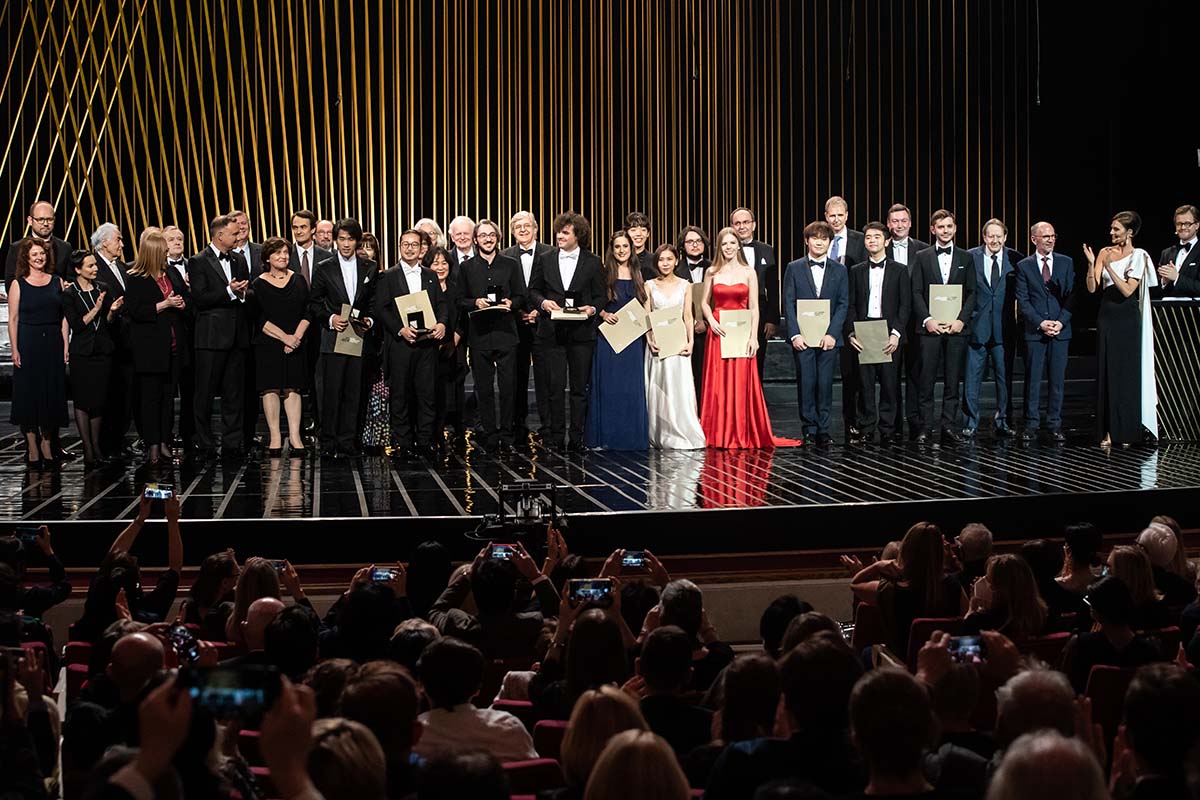
The official poster for the upcoming Chopin Competition is the work of Marcin Władyka. The competition for its design attracted fifteen Polish and foreign artists, who altogether submitted thirty proposals. As Professor Błażej Ostoja Lniski, Rector of the Academy of Fine Arts in Warsaw, emphasised, the jury were particularly captivated by “the clarity and universality of the message, and by its original reference to the tradition of portraying Fryderyk Chopin.”
Where to listen to the Chopin Competition?
As soon as (…) I opened the front door, I saw a boy of perhaps eight or nine standing there. (…) The conversation was short: – Sir, why don’t you buy tickets to Chopin? – How many do you have? – As many as you want. – How much? – The official price.
I turned down his offer. Yet I soon thought (…) There you are, toiling, asking favours from acquaintances, and queuing by the hour to get to the Competition, and here’s that absolute stranger of a little boy, who has gotten hold of tickets, and is now offering to sell them to you disinterestedly! Why then didn’t I take them? (…) Could it be that I suspected that these were the Warsaw crooks who had sent him with forged or stolen tickets, knowing that a child cannot be made legally responsible? Should even these presumptions prove true, they can still instil us with certain optimism. Once the professional sharp operators considered those tickets. (…) “a hot commodity”, at par with tickets to a boxing or football match, there can no longer be any doubt – Chopin has really made his way to the people.W. Kopaliński, “The Temptations of Kindness”, Życie Warszawy, 1955, No. 68, pp. 3–4.
As tickets for the auditions have sold out, the Chopin Competition will be accessible in 4K quality on the following platforms:
- The official website of the 19th Chopin Competition: https://chopincompetition.pl
- Chopin Competition mobile app for smartphones
- The Chopin Institute’s YouTube channel
- The Chinese social media platform Weibo
- Television broadcasts on TVP Kultura
- Radio broadcasts on Polish Radio Channel 2 and Radio Chopin
- The Chopin Institute’s social media channels, including Instagram and Facebook, available in six languages.
The Competition website and mobile app will also feature a range of additional content: competitor bios; interviews with performers, members of the jury, and journalists; photo galleries from all stages of the contest; the Competition’s promotional video; photo coverage and recordings from accompanying events; and archival photos and footage from the eighteen previous editions.
Partners and Sponsors of the Competition
The Chopin Competition could not be held on such a spectacular scale without the generous support of its partners and sponsors. The companies supporting the Competition include prime Polish and international enterprises of global outreach. The Patron of both the Chopin Competition and the Chopin Institute is PKN Orlen – Poland’s oil giant. The Main Partner is Totalizator Sportowy, with Google serving as the Technology Partner, and LOT Polish Airlines – as the Official Carrier. The Chopin Competition is cofinanced by the Ministry of Culture and National Heritage of the Republic of Poland.
Bruce (Xiaoyu) Liu, winner of the 18th Chopin Competition
I could go on about Chopin and his music all day long. I believe he must have been noble, nostalgic, shy – and a patriot. He must have had an inner fire and a great heart; he was the kind of gentleman who conceals all his feelings.
As for the Chopin Competition, I believe that what adds to its uniqueness is the plethora of Chopin aficionados all around the world, who meticulously follow this event, many of whom are true experts. You may win those audiences over or not, yet that is immaterial in the end, as the quality and degree of understanding Chopin’s music here are at the highest level. You are surrounded by so many people passionate about music.
While preparing for the Competition throughout the previous year, I kept learning new repertoire and looking for new concepts and directions in interpretation. One of my ways of studying was to learn non-Chopin repertoires, to keep Chopin’s works fresh and not to “overplay” them. That’s my method. I reflected on how to work even better, and setting some music matter aside for a time can be the best way. It’s like in life: sometimes you need to go out to a bar, chill with friends, and simply occupy your head with something else.
That helps greatly, at least in my case. I believe that the hardest part of being a pianist is keeping the repertoire fresh, and finding inspiration and creativity consistently. At the same time, these also bring plenty of joy, as they never allow for any boredom. You may go on performing the same pieces, but you can always find new ways to interpret them.